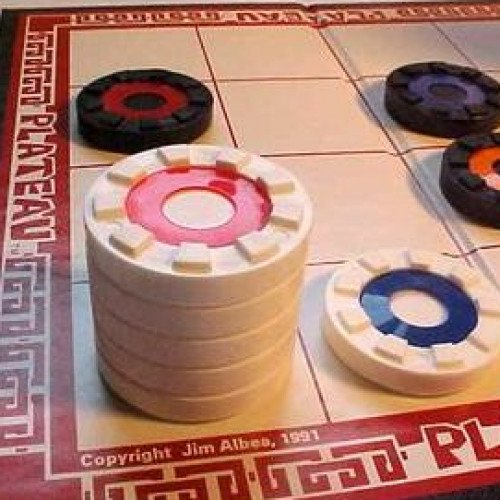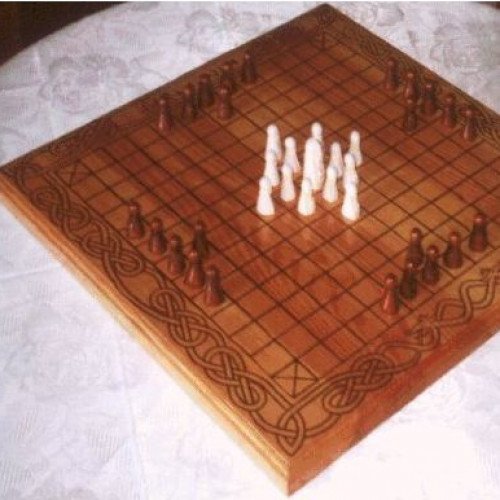PLATEAU VS TABLUT

PLATEAU
Plateau is a two-player abstract strategy board game invented by Jim Albea. The game was developed over a two-year period culminating in its present form on May 12, 1986. The original name for the game was Pinnacle, but it was discovered that an older board/card game had that name, so around 1989 the name was changed to Plateau. From the 1980s through the 1990s Plateau was played at Science Fiction conventions mostly in the Southeastern United States. From the 1990s to the present, the game is played live at an online game site and via email. In 1997 a computer implementation of the game was created which facilitates email play and has a computer robot. Onboarding is adding one new piece to the play. This new piece can be placed anywhere that doesn't directly harm an opposing piece. For instance, you can onboard to any blank square or on top of any of your own pieces. The majority of Plateau moves are onboards. Instead of Onboarding or Moving, a player can choose to spend his turn exchanging prisoners. Prisoners are exchanged using the point values of the pieces. A simple value-for-value system is used. Since the pieces range in value from 1 point (for the mute) to 21 points (for the Ace) there are usually several combinations and options available for the players. The player initiating the exchange selects the pieces he wishes to exchange. These pieces will all add up to some point value. The responding player then has four options depending on the point values of the prisoners that he holds.
Statistics for this Xoptio

TABLUT
Tafl games (pronounced ], also known as hnefatafl games) are a family of ancient Nordic and Celtic strategy board games played on a checkered or latticed gameboard with two armies of uneven numbers. Most probably they are based upon the Roman game Ludus latrunculorum. Names of different variants of Tafl include Hnefatafl, Tablut, Tawlbwrdd, Brandubh, Ard Rí, and Alea Evangelii. Games in the tafl family were played in Norway, Sweden, Denmark, Iceland, Britain, Ireland, and Lapland. Tafl gaming was eventually supplanted by chess in the 12th Century, but the tafl variant of the Sami people, tablut, was in play until at least the 1700s. The rules for tablut were written down by the Swedish naturalist Linnaeus in 1732, and these were translated from Latin to English in 1811. All modern tafl games are based on the 1811 translation, which had many errors. New rules were added to amend the issues resulting from these errors, leading to the creation of a modern family of tafl games. In addition, tablut is now also played in accordance with its original rules, which have been retranslated. The term tafl (Old Norse: "table", "board"; pronounced ) is the original Norse name of the game. Hnefatafl (roughly) plausibly realised as ), became the preferred term for the game in Scandinavia by the end of the Viking Age, to distinguish it from other board games, such as Skáktafl (chess), Kvatrutafl (Tables) and Halatafl (Fox games), as these became known. The specific name Hnefatafl possibly arose as meaning "board game of the fist", from hnefi ("fist") + tafl, where "fist" referred to the central king-piece. The precise etymology is not entirely certain but hnefi certainly referred to the king-piece, and several sources refer to Hnefatafl as "King's table". In Anglo-Saxon England, the term tæfl also referred to many board games. It is not known if the Anglo-Saxons had a specific name for the game or if they generically referred to it as tæfl in the way that modern people might refer to "cards". Several games may be confused with tafl games, due to the inclusion of the word tafl in their names or other similarities. Halatafl is the Old Norse name for Fox and Geese, a game dating from at least the 14th century. It is still known and played in Europe. Kvatrutafl is the Old Norse name for Tables (the medieval forerunner of Backgammon). Skáktafl is the Old Norse name for chess. Fidchell or Fithcheall (Modern Irish: Ficheall) was played in Ireland. The Welsh equivalent was Gwyddbwyll and the Breton equivalent Gwezboell; all terms mean "wood-sense". This popular medieval game was played with equal forces on each side and thus was not a tafl variant, but rather may have been the medieval descendant of the Roman game Latrunculi or Ludus latrunculorum.